Patience Is The Virtue In Biotechnology
Despite the malaise
and gloom hanging over the markets today, particularly on the technology side of
the Nasdaq, I am very optimistic about biotechnology in 2001 and beyond.
The fundamental reason for this optimism is simply supply and demand.
The demand for new drugs and new diagnostic technology will be feverishly
fueled by the millions of baby boomers about to enter the over-55 club.
This growing segment of our population will continue to demand better
treatments for a variety of diseases afflicting them.
This demand will mainly fall on the growing numbers of biotechnology
companies on the cusp of new technology and research.
Many of these
companies today are flushed with cash from either their initial IPO or secondary
offerings. Along with money in the bank
comes newfound independence. In the past,
many in the biotech sector relied heavily on the heavies in the pharmaceutical
industry for cash for clinical trials, for marketing and distribution of their
products, and for short-term survival.
That was then; this is now.
Today
the tide has seemed to turn simply because the biotechs have the cash and the
emerging technology to develop their own drugs. This
is particularly true for the genomic companies mining the human genome. Many biotech companies now have developing pipelines, have
revenue-generating drugs on the market, and many are becoming more profitable. Next year is expected to bring 25 to 30 biotech companies to the land of
profitability, up from a handful five years ago. The FDA is expected to approve a record number of new drugs from the
biotech sector next year to treat a variety of illnesses. This will further add to the growth potential of many in the sector and
further distance itself from the shadow of the major pharmaceutical companies. Below, I will discuss some of the companies that will come into focus
next year.Â
Cor TherapeuticsÂ
(
CORR |
Quote |
Chart |
News |
PowerRating)Â
The lead product of
Cor Therapeutics is an anti-clotting drug used now during angioplasty for heart
disease to prevent clots from forming. Angioplasty
is a procedure performed by cardiologists to open up clogged heart arteries with
a balloon. Heart disease is the
number one killer of people in the western world, and there are hundreds of
thousands of angioplasty procedures performed each year to open up clogged
arteries. Cor’s lead product,
Integrilin, is used minimize the risk of heart attack, stroke, and death during
this procedure. The drug works by
inhibiting the platelets in our blood from clotting. It works well and has not been on the market that long.
The drug is gaining market share from such competitive giants as Merck
and Johnson & Johnson and next year is expected to go over 50% of a potential $2
billion market. In addition, the
company is lobbying the FDA for expanded use of the drug to treat blocked heart
arteries, and this could further increase growth. Cor is also developing a pill form of its anti-clotting drug since
Integrilin can only be given intravenously. The company is also expanding its drug efforts into cancer and is
developing several anti-cancer drugs.
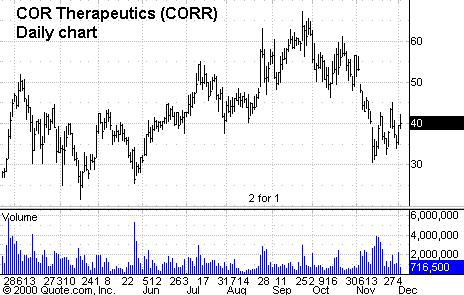 Â
Â
CurisÂ
(
CRIS |
Quote |
Chart |
News |
PowerRating) Â
Curis is a company
that was formed by the merging of three biotech firms, Ontogeny, Creative
Biomolecules, and Reprogenesis. The
company is in the business of regenerative medicine, developing drugs used to
treat or replace damaged tissues in the body. This is big business since many of today’s blockbuster diseases involve
the degeneration of tissues as we age. For
instance, osteoarthritis, a disease affecting millions of people, results in the
wearing away of bone along many areas of our skeleton.
Curis expects to
have its first product on the market next year. The drug is called OP-1 and is a protein that stimulates bone growth. It is designed to be used to treat fractures and eliminate the need for
bone grafts. Bone fractures are a
very common and deadly problem, particularly in the elderly.
The market for a drug to enhance the healing of fractures is very large
and growing.Â
The company is also
developing a drug to treat bladder disorders in children along the same lines,
to enhance the growth of new, non-diseased tissue. Curis is also developing proteins, which have the potential to stimulate
nerve growth and treat diseases which damage nerves, such as spinal cord
injuries or stroke. One last
interesting fact on this company is Paul Allen, one of the founders of
Microsoft, owns 7.5% of the company.Â
Â
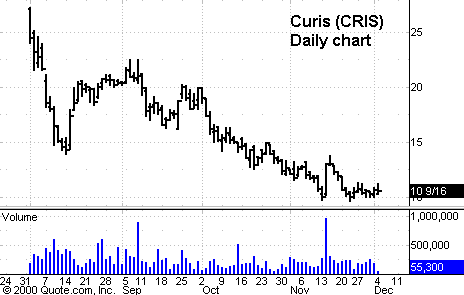
CelgeneÂ
(
CELG |
Quote |
Chart |
News |
PowerRating) Â
Celgene is a company
involved in developing new drugs to treat cancer. Its lead anti-cancer drug, thalidomide, is currently being tested to
treat a variety of different types of cancer. Thalidomide is currently approved for the treatment of leprosy and does
generate revenue for the company. However,
doctors are finding out that this drug can be very effective in treating a
variety of advanced cancers. The
drug has been shown to be very effective in treating patients with a bone marrow
cancer called multiple myeloma. It
is also being tested to treat colorectal cancer, some leukemias, prostate cancer and kidney cancer.
Thalidomide
works by choking off the blood supply to the cancer cells and causes them
ultimately to die. I believe next year
will continue to bring more positive data on the anti-cancer effects of
thalidomide from a variety of ongoing clinical studies. Celgene has also begun testing
a second-generation thalidomide
analogue for the treatment of multiple myeloma that is more potent and has fewer
side effects. Over the next several
years, thalidomide might be an integral part of many drug regimens to treat
advanced cancer and Celgene will benefit greatly because of it.
Celgene has also
invested in genomics by acquiring Signal Pharmaceuticals this year. Signal Pharmaceuticals uses genomic technology to discover and develop
novel ways to treat cancer. Their
approach will nicely augment Celgene’s focus on developing new ways to treat
cancer.
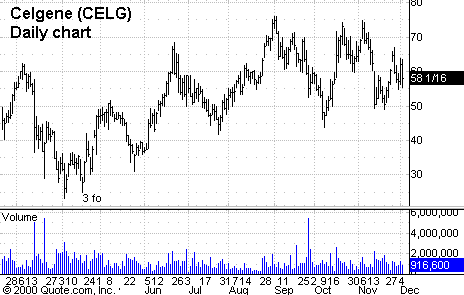 Â
Â
Monoclonal AntibodiesÂ
I believe monoclonal
antibodies will be a big winner next year as a novel approach to treat a variety
of diseases. Monoclonal antibodies
are highly specific proteins which can target any molecular aspect of any
disease. In the early 1990s, these
proteins were considered magic bullets and were heralded as the way to cure
cancer. However, the technology
back then was not as refined as it is today and many did not live up to their
potential.
This is surely not the
case today. Many companies who make
monoclonal antibodies now are producing highly specific proteins that are much
more effective as drugs. Just look
at how successful Genentech’s Herceptin, a monoclonal antibody directed
against proteins found in breast cancer cells for the treatment of advanced
breast cancer, has been. Idec
Pharmaceuticals’ lead drug to treat a specific type of lymphoma is also a
recently developed monoclonal antibody that is very effective and generating
revenue. With the deciphering of
the human genome, many new gene-based drug targets will be discovered for a
variety of diseases that will be amenable to monoclonal antibody treatment.
There are several
companies who are strictly in the business of producing monoclonal antibodies,
and these companies will experience excellent growth in the upcoming years. Abgenix
(
ABGX |
Quote |
Chart |
News |
PowerRating) is one of the leaders in this growing field of
highly specific monoclonal antibody production. The company has over 20 alliances with all the major players in the
pharmaceutical and biotech industry. It
is also developing several of its own monoclonal antibody drugs to treat
different cancers and some immunologically based diseases. I look for continued growth from this company next year as more drug
targets are discovered from the human genome.
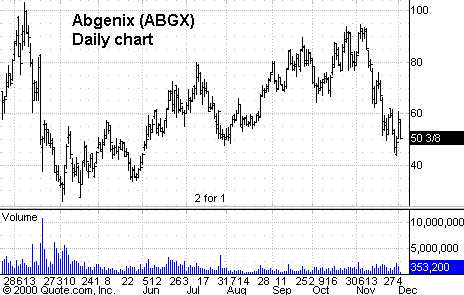
Medarex
(
MEDX |
Quote |
Chart |
News |
PowerRating)
is another company in the business of producing monoclonal antibodies. Like
Abgenix, this company has the ability to produce highly specific
monoclonal antibodies against a variety of drug targets. Like
Abgenix, its technology is and will continue to be in high demand as
researchers continue to realize the effectiveness of monoclonal antibodies in
the treatment of disease.Â
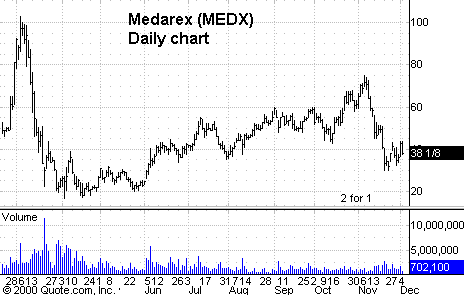
Cambridge
Antibody Technologies is
currently listed on the London Stock Exchange (CAT is its symbol on that
exchange) and is another company with a
unique way of mass producing very specific monoclonal antibodies as drugs. The company is developing a nice niche with its unique technology and
many major pharmaceutical companies are taking notice. It has no products on the market, however, its revenue-producing alliances
will continue to grow. Cambridge
Antibody Technologies is also expected to be listed on the Nasdaq some time
early next year.
Myriad Genetics
(
MYGN |
Quote |
Chart |
News |
PowerRating)
Myriad Genetics is a
company involved in developing new drugs and diagnostic tests based on the
discovery of disease-related genes and their proteins. This company is based in Utah and has the benefit of researching many
genetically-linked diseases from the meticulous Mormon family records kept in
that state.Â
The company has already
discovered genes linked to breast cancer, prostate cancer, colorectal cancer
and heart disease. It has developed
several diagnostic test kits used to test for several inherited types of cancer. These diagnostic kits are generating revenue and will grow in use as more
genes are discovered. The company
is also using the information discovered in these genes toward the development
of new drugs for treatment. Myriad
Genetics is poised to take full advantage of the potential growth in the
genomics industry over the next several years.Â
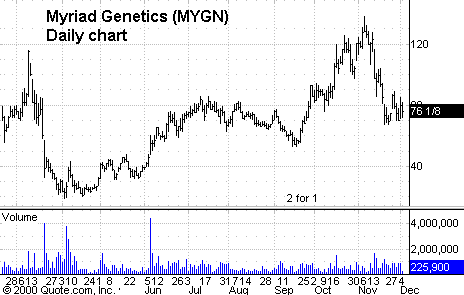 Â Â Â Â Â Â Â Â
       Â
